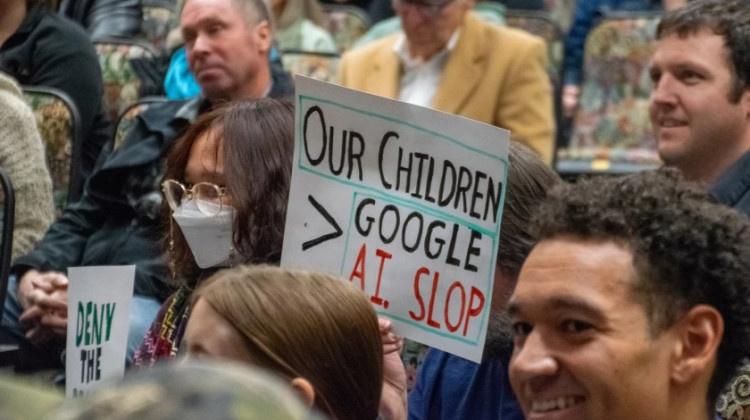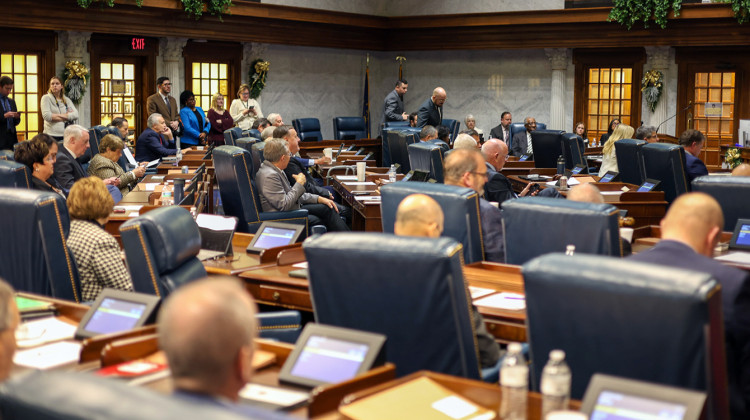Wearing mostly dark colored suits, the 60 men and women of the IMPD’s ninth recruit class stood tall and raised their right hands as Indianapolis Mayor Greg Ballard led the reading of the oath of office.
When he was done, Ballard told the class that their acceptance into the academy is not the finish line, but the starting point of their careers.
"Today is the only day that the real work begins," said Ballard. "My challenge to you today is to reach beyond the goal of becoming an IMPD officer and set the goal for the type of IMPD officer that you want to be."
Babacar Diouf wants to be an officer that leads in the community.
The 33-year old is one of the 60 new recruits. He says it’s been a lifelong dream of his to don the blue uniform and sees his acceptance into the academy as an opportunity to create a safer, more cohesive city.
"It's a community where we live and a community that we are a part of, so, we have to continue doing nothing but the positive and building the community-police relationship," said Diouf.
Diouf and the other recruits were chosen from thousands of applicants. For months they took written and physical exams and underwent interviews before receiving their certificate of appointment.
Fellow recruit Alisha Bernhardt admits the process was stressful and frustrating at times, but is committed to being an officer for similar reasons as Diouf.
She has worked in the medical field and with the fire department, but was always drawn to the police force because of the way officers can connect with people.
"I can park my patrol car at a school and walk in and just say 'hi' to the kids or go into a community meeting and just meet people," she said. "I know that I'm their light on their worst days and that means a lot to me to be able to protect the people in the community."
But, with a homicide rate on pace to be the worst in nearly a decade, Bernhardt understands the challenges that lie ahead.
"Violence - it is getting worse in Indianapolis and that's why they are hiring us on," said Bernhardt. "The people who I have met so far in my recruit class, I think that we are all kind of like minded in the fact that we do want to see a difference. We don't want to be scared to walk down the street or go to the store or something like that. So, I think us as a whole, we are ready to go out and there and not just fight the crime that's happening, we want to be a little more proactive."
Department of Public Safety Director Troy Riggs says getting the recruits into the academy is a step in the right direction in addressing the city’s crime issues.
But, he says about 55 of the 60 will actually become officers with the others dropping out. And, those who do complete the academy won’t be on the streets for about a year.
"And then it takes a couple more years from there where they really start feeling comfortable. I know this because I was a rookie at one time," he said. "It's a difficult job. It's one of the most complex jobs in the United States today. We are very fortunate to find 60 highly qualified individuals that are willing to step up to the plate."
But he says adding police isn’t going to solve all of the city’s problems.
"People need to understand that additional officers on the street doesn't mean that crime necessarily goes down lower," said Riggs. "It means we have more people out there, eyes and ears. We need citizens to work with these officers to help us support us in reducing crime, in reducing fear of crime."
For now, Fraternal Order of Police President Bill Owensby thinks crime in Indianapolis is going to get worse before it gets better.
"There is no way you can tweak the numbers to where it doesn't get worse," he said.
He says in order to see real change; the city needs to invest even more in hiring officers.
The new class is the first since 2011 and Owensby says the recruits sworn in Monday are mostly going to replace ones who retire or leave the force. Owensby thinks Indy needs about 200 to 300 more police on the streets.
"Being a reactive police department, in other words showing up after the crime has occured, does absolutely nothing for the crime rate but leave it alone or allow it to increase," said Owensby. "You have to have a proactive police department in order to have an effect on crime. We can not have a proactive police department unless we have the numbers to do that."
Ownensby calls Indianapolis police staffing a “dire” situation and says there is consideration of reducing services if nothing is done
IMPD plans to hire another 20 officers by the end of the year. The City County Council is considering a plan to hire 400 officers by 2018. With attrition, that would mean a net increase of 232 on the streets in the next four years.
Doing so is expected to cost millions and a police staffing commission recommended paying for it through tax increases.
As for the recruits sworn in Monday, training is already underway.
 DONATE
DONATE






 View More Articles
View More Articles



 Support WFYI. We can't do it without you.
Support WFYI. We can't do it without you.